Nietzsche, Friedrich Wilhelm, and Graham Parkes. Thus Spoke Zarathustra: a Book for Everyone and Nobody. Oxford University Press, 2008. First published 1883–1891.
—
See Setsuko Aihara: Zarathustra by the Sea.
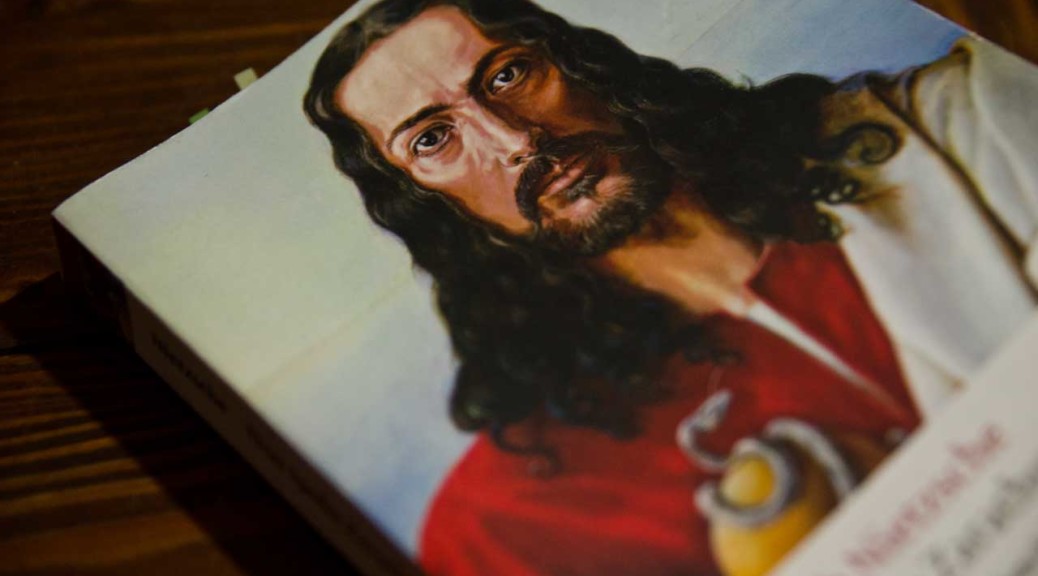
—
See Setsuko Aihara: Zarathustra by the Sea.
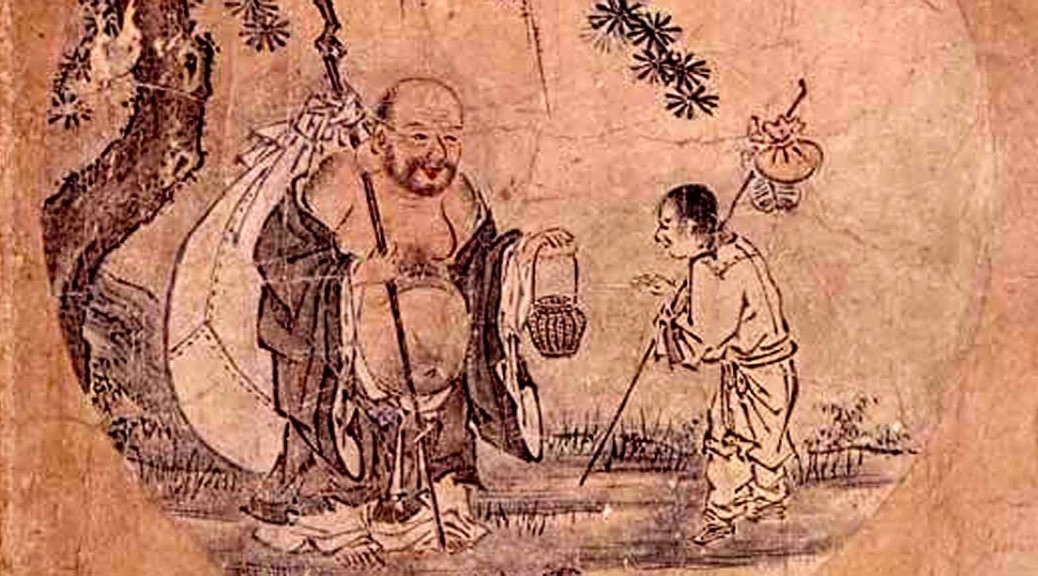
一
In Search of the Bull
In the pasture of the world,
I endlessly push aside the tall
grasses in search of the Ox.
Following unnamed rivers,
lost upon the interpenetrating
paths of distant mountains,
My strength failing and my vitality exhausted, I cannot find the Ox.
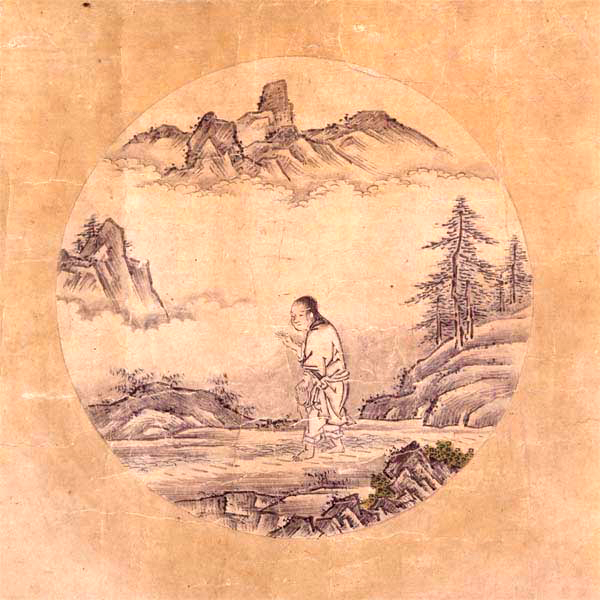
“Discovery of the Footprints” by Tenshō Shūbun. Via Wikimedia.
二
Discovery of the Footprints
Along the riverbank under the trees,
I discover footprints.
Even under the fragrant grass,
I see his prints.
Deep in remote mountains they are found.
These traces can no more be hidden
than one’s nose, looking heavenward.

“Perceiving the Bull” by Tenshō Shūbun. Via Wikimedia.
三
Perceiving the Bull
I hear the song of the nightingale.
The sun is warm, the wind is mild,
willows are green along the shore –
Here no Ox can hide!
What artist can draw that massive head,
those majestic horns?
四
Catching the Bull
I seize him with a terrific struggle.
His great will and power
are inexhaustible.
He charges to the high plateau
far above the cloud-mists,
Or in an impenetrable ravine he stands.
五
Taming the Bull
The whip and rope are necessary,
Else he might stray off down
some dusty road.
Being well-trained, he becomes
naturally gentle.
Then, unfettered, he obeys his master.
六
Riding the Bull Home
Mounting the Ox, slowly
I return homeward.
The voice of my flute intones
through the evening.
Measuring with hand-beats
the pulsating harmony,
I direct the endless rhythm.
Whoever hears this melody
will join me.

“The Bull Transcended” by Tenshō Shūbun. Via Wikimedia.
七
The Bull Transcended
Astride the Ox, I reach home.
I am serene. The Ox too can rest.
The dawn has come. In blissful repose,
Within my thatched dwelling
I have abandoned the whip and ropes.
八
Both Bull and Self Transcended
Whip, rope, person, and Ox –
all merge in No Thing.
This heaven is so vast,
no message can stain it.
How may a snowflake exist
in a raging fire.
Here are the footprints of
the Ancestors.
九
Too many steps have been taken
returning to the root and the source.
Better to have been blind and deaf
from the beginning!
Dwelling in one’s true abode,
unconcerned with and without –
The river flows tranquilly on
and the flowers are red.
Barefooted and naked of breast,
I mingle with the people of the world.
My clothes are ragged and dust-laden,
and I am ever blissful.
I use no magic to extend my life;
Now, before me, the dead trees
become alive.
—
Verses by Kuòān Shīyuǎn
Translation by Senzaki Nyogen (千崎如幻) (1876–1958) and Paul Reps (1895-1990).
Paintings by Tenshō Shūbun (天章周文) (1414-1463
From Ten Bulls Wikipedia article.
See:
http://www.buddhistdoor.com/OldWeb/passissue/9710/sources/art9.htm
http://www.columbia.edu/cu/weai/exeas/resources/oxherding.html
http://www.columbia.edu/cu/weai/exeas/syllabi.html
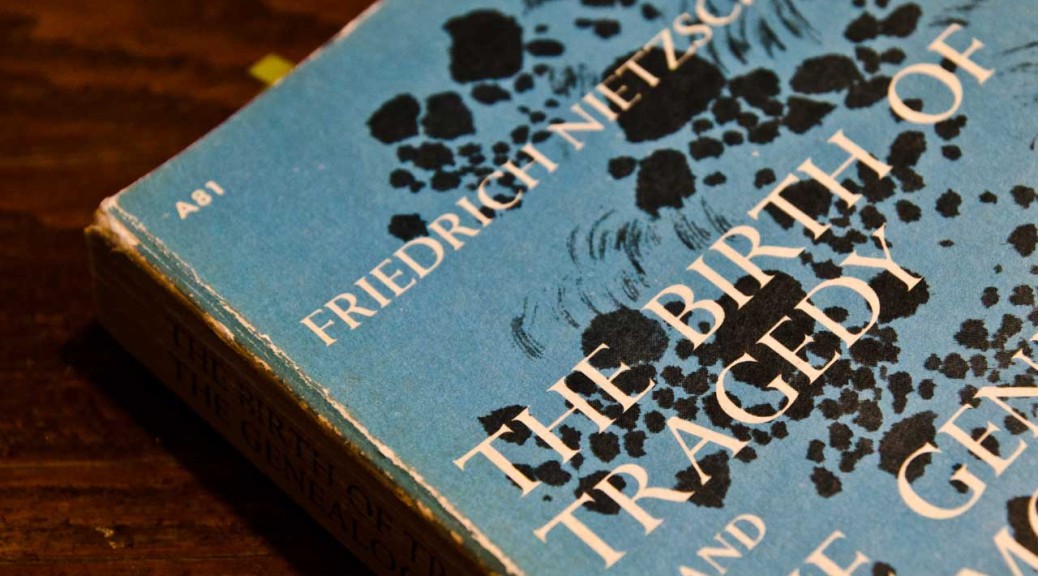
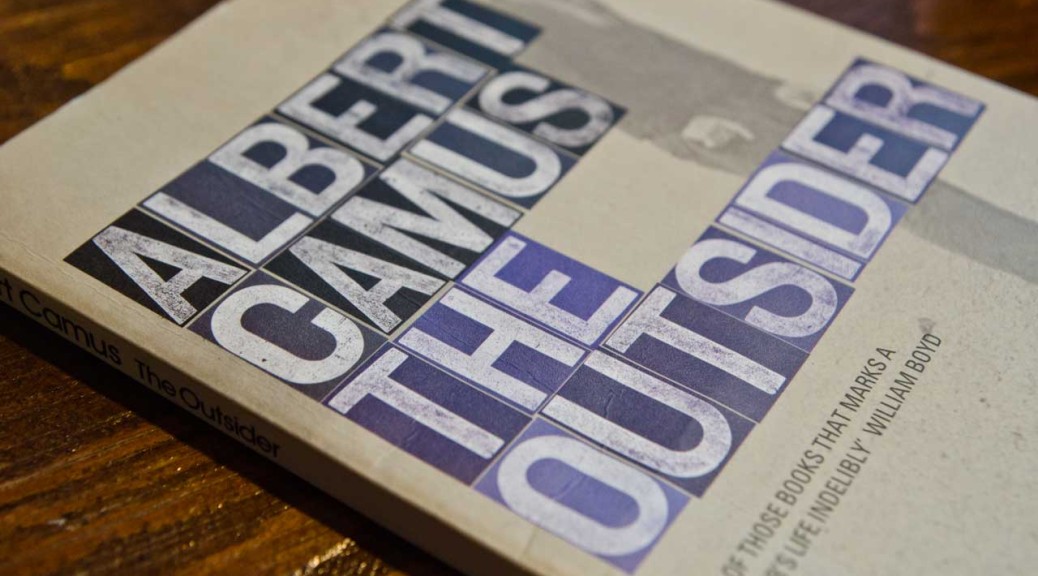
—

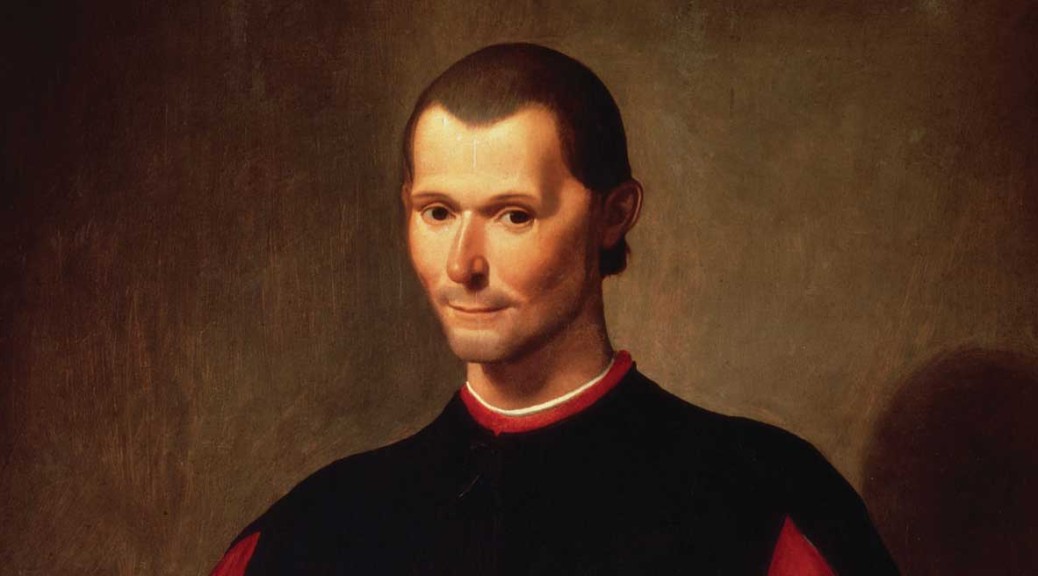
“He says that the ancients understood state craft better, when they figured The Prince as a centaur. The centaur is half man and half beast, and that’s what it is to understand state craft. Manly virtue will never be enough, you’ve got to be ready for beastliness, and the centaur is half beast. Now, that is presented directly as a satire of Cicero.”- Prof. Skinner
“Cicero had said, ‘Force is beastly and is to be avoided, that is simply the lion. Fraud is beastly and that is to be avoided, that is simply the fox’. And Machiavelli says, ‘Since you need to know how to be beastly, you had better know which particular beasts to imitate, and then in the most famous phrase in the book he says, ‘Those who have done best as princes in our time have known how to imitate the lion and the fox’.” – Prof. Skinner
‘You’re going to have to cheat, you must do your best to appear not to be cheating’, and that again is satirical in respect of Cicero’s De Officiis, because one of the things which Cicero keeps telling us is, ‘Fraud will always be found out. So you cannot gain true glory by pretence’, I’m now quoting Cicero, ‘because your pretences will always find you out’ And that becomes a biblical thought too. ‘Be sure your sins will find you out’. Now, one of the most important things that Machiavelli wants to tell The Prince is not to worry about that, because it’s not true. And he’s very keen on the fact that The Prince is not performing his politics in republican conditions. In republican conditions, you’re out in the piazza, everyone has a vote, it’s all public. People are watching you. You’ve only been elected, their turn will come, it’s a communal activity, everything is in the bright light of day. It’s not so for The Prince.” – Prof. Skinner
From Chapters 15-24 “‘Be courageously evil where it’s necessary to be evil, but otherwise follow what people regard as the virtues as much as possible. Because if you don’t, they’ll hate you, and if they hate you, you’re in trouble’. -Prof. Skinner

La muerte de Séneca. 1871. Manuel Domínguez Sánchez. Museo de Prado, Madrid. El título completo dado por el pintor fue: Séneca, después de abrirse las venas, se mete en un baño y sus amigos, poseídos de dolor, juran odio a Nerón que decretó la muerte de su maestro. Via Wikimedia.
“Machiavelli does himself say at one point in Chapter 15 – this pivotal and notorious chapter where he introduces the virtuoso prince who is not always virtuous. He says ‘I’m teaching you that sometimes you must learn, how not to be good’, and it’s interesting he doesn’t say there, virtuoso, he says buono, a good person. ‘Essarai non buono’ – how not to be a good person.”” – Prof. Skinner
“If you’re a prince, you need to go against conventional Christian or classical morality, if you’re an ordinary person, perhaps, you may want to carry on according to Christian or classical morality.” -Prof. Skinner
Bambi Meets Godzilla | Marv Newland (1969)
“To succeed, a film must treat the audience member as an audience member, not as a commissar of culture.” location 698
“The commissar gets her thrill not from the film but from the power to admonish.” location 699
real filmmakers “Will they fail? Certainly. Both artistically and commercially. But (a) they have no other choice and (b) realizing that their final choices must be essentially subjective, they may learn to trust their instincts. Also (c) they’ll have more fun.” location 702
“Like any human endeavor, like you and me, they have inevitably been exposed to and have, in the main, submitted to the power of self-corruption, of self-righteousness, to the abuse of power. But like General della Rovere, like you and me, like the studio executives, they possess the possibility of beauty and, hence, for human transformation: not as preaching, not as instruction, not as doctrine—all of which, finally, are out of place in the cinema and can awaken, at best, but self-righteousness.” location 740
“The garbage of exposition, backstory, narrative, and characterization spot-welds the reader into interest in what is happening now. It literally stops the show.” location 866
***”When the film turns narrative rather than dramatic, when it stands in for the viewer’s imagination, the viewer’s interest is lost.” location 1040
***”The writer may choose to supply stock, genre, or predictable answers to the magic questions, and the drama will be predictable and boring. The writer will have saved himself the agony of indecision, self-doubt—of work, in short—and so, of course, will the protagonist.” location 1230
“The gags, here, happen to be identical to Aristotle’s “incidents,” that is, those occurrences without which the plot cannot move forward.” location 1391
“Shoot an entrance and an exit. It’s free.” location 1627
***”Our ability to conceptualize about both the process and the product is accompanied, and inspired, by the pure animal joy of submersion in a mystery.” location 1653
“Wisdom, therefore, lies not in the phenomonological question “What does a duck look like?” but, rather, in the practical “What is a duck looking for?”” location 1658
******”one may learn to prevail through understanding rather than strength—the basic tenet of jujitsu” location 1668
“Well, the poor man, unhampered by the capacity to waste, was forced to employ thought, and he wondered: What does a duck like? How does a duck see?” location 1678
“We have all had the experience of saying of a statue, “How lifelike,” and, of a life mask, cast from the human form and painted to perfection, “How lifeless.”” location 1679
“For the actual human being and the actual duck were created by, and so contain, a mystery. They cannot be reduced to mere measurements, and all attempts to do so (whether through the caliper of the decoy maker or through the audience testing of the social scientist) result in lifeless parody.” location 1681
“For another name for “chance” is “mystery,” and another name is “art.”” location 1685
“Jewish rabbinical tradition notes that adultery is like murder, for it is a crime that cannot be undone. Violation of the aesthetic distance is a rupture of the artist’s compact with the audience, and, similarly, its rupture cannot be mended.” location 1790
***”the difference between enjoyment and stimulation. One leaves the ballet feeling refreshed, as a promise has been fulfilled. One quits the video-game or pornographic film feeling empty and vaguely debauched—for one has only been stimulated. The brain, here, craves a repetition of the stimulation, as with any drug.” location 1833
“One may sit in front of the television for five hours, but after King Lear one goes home.” location 1835
*****”violence—their belligerence masks their fear and displays their ignorant belief that battles are somehow won by intimidation.” location 1894
“Violent encounters are won only by those putting themselves at risk of violence.” location 1895
“Aristotle cautions that it is insufficient for the hero to get the idea. Many modern moviemakers, however, act as if they hadn’t read his book. Their films depict the gentle progress of the protagonist toward self-actualization—usually depicted as a slow, arms-extended twirling on a beach (as if the expression of a racial memory of our descent from the shipworm). location 2040
“These men, and their performances, are characterized by the absence of the desire to please.” location 2055
“On screen, they don’t have anything to prove, and so we are extraordinarily drawn to them. They are not “sensitive”; they are not antiheroes; they are, to use a historic term, “he-men.” location 2056
“But consensus is, of course, the dead opposite of that subjectivity that is the essence of the theatrical experience.” location 2385
*******”And so, now firmly self-understood as part of a jury, he utters the phrase that is the foundation of society and the death of art: “What do you think?” Consensus, enshrined as right thinking, ensues, and the stage is set for mediocrity.” location 2400
“productive subjectivity” location 2441
“They are lost in the wilderness and prefer, as might you or I, a broken compass to no compass at all.” location 2449
“They who lack talent expect things to happen without effort.” location 2546
December, 2013.